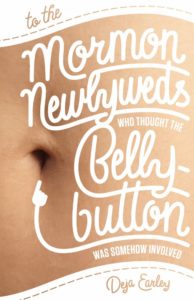 Author: Deja Earley
Author: Deja Earley
Title: To the Mormon Newlyweds Who Thought The Bellybutton Was Somehow Involved
Publication: Salt Lake City: Signature Books, June 2018.
Genre: Poetry
Reviewed by Amanda Mae Monson, Sept. 10, 2018
I went into reading this poetry collection chuckling at the title, the confusion and misconceptions of young Mormons who don’t have a good or complete understanding of human anatomy or how conception works. This very topic comes up often enough among my friends on social media, amused by it and also saddened by the lack of knowledge and preparation some of our fellow Saints have when they enter marriage. Many of us lament that sex is treated as so sacred in our culture that many miss out on learning just exactly what it is. So to have a collection that touches on that is refreshing.
The collection starts out with a moment of a young girl’s naivete when she looks at a pair of pretty earrings that are actually the Playboy emblem. Haven’t we all had a moment like this when we find ourselves attracted to something at a base level and didn’t yet grasp the implications or backstory behind it? The book plays out snippets of memories from childhood discovery, from innocently exploring the part of your body between your legs in the living room, to finding defiance, to getting a first kiss at a church dance, to my personal favorite “Sex Talk Sunday” (we all have our stories about this bastion of Mormon church culture) that puts the “licked baked good” object lesson so many of us have had in a different light. And that’s just for starters. There’s poems that touch on sexuality in various forms and at various levels, and not necessarily Mormon-specific, but surely more common among our culture.
Not all of the poems are such a direct relation to the title, but touch on the familiar and general topics of family, in its various incarnations and developments, uncertainty as new chapters of life begin and end, ruminations on remembrance and love. The title poem itself is deliciously erogenous and also beautiful in its portrayal of young innocent love that develops into something deeper and more meaningful. I appreciate the poet taking what could be an embarrassing and even scarring moment and turning it into a moment of growth.
I frequently have trouble reading poetry, since it’s not my chosen medium, but this collection is approachable for me. I can find themes and moments and lines in it that resonate with me. I can connect the lines and stanzas with my own experiences and feel an affinity with other members of my faith tradition. I found the whole of it invigorating to read and even say out loud to myself, enjoying the words for the recollections they bring to mind.
Amanda is a librarian and displaced Southerner living in Happy Valley who loves to talk about what she’s reading.
